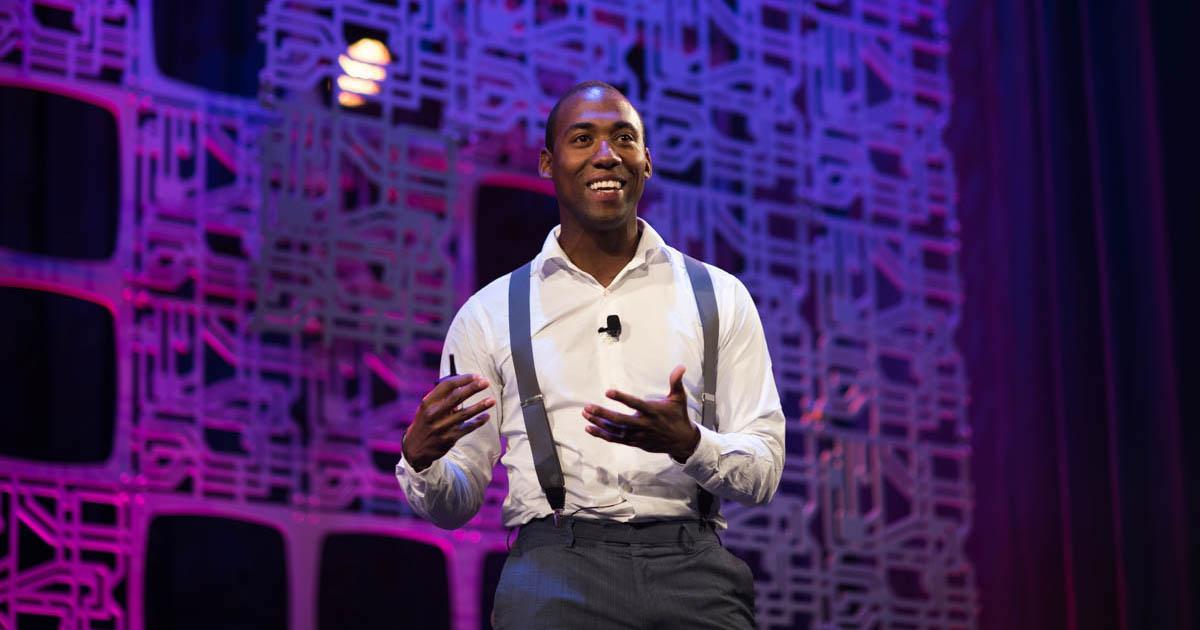Thousands of farm workers lost their jobs between 1910 and 1930 after the internal combustion engine tractor was introduced. And listening to Ross Simmonds, an astute student and teacher of the fine points of artificial intelligence (AI), you might be worried that technological advancements could replace you, too.
“Where it used to take hundreds of people performing manual labor to sustain a large farm, after the tractor was rolled out it took maybe 10 or 15 people at most,” says Simmonds, founder of Foundation Marketing, a successful entrepreneur and a frequent lecturer on topics including marketing, B2B growth, social media, entrepreneurship and digital trends such as AI.
While it may seem hard for white-collar workers such as event planners and marketers to compare themselves to people who worked with their hands in the corn fields and apple orchards at the dawn of the 20th century, there could be much more of a commonality than one might think.
“Nobody likes to think they are replaceable, especially by a computer, but there are unmistakable trends going on right now that are certainly worth paying attention to,” says Simmonds, who will offer insights into AI trends during his session “How Artificial Intelligence Will Impact Your Organization Today and Tomorrow” at the 2019 MPI World Education Congress, June 15-18 in Toronto.
“If you look at industries where a lot of physical labor takes place, there’s no question that AI has eliminated lots and lots of workers’ jobs year after year,” he says.
But what many people may not know is that AI is already starting to move into the tasks performed daily by white-collar workers and will ultimately make a significantly larger impact than it does now.
“The primary role of AI right now is that it is taking tasks that we do repetitively and doing them more efficiently than a human can,” Simmonds says. “For instance, AI is reading all of the questions that a service provider will be asked online on a daily basis and answering them and creating a database on the back end. AI is answering those questions using information that we as people have provided.
“But it goes much, much deeper than that. It can go into billing, for instance, where AI can scan every bill, every day and see if there are any issues that would relate to fraud. Each time a customer buys something with a credit card from a provider of goods and services, AI inspects that transaction and then notifies billing management if there is something that needs to be done with that transaction in terms of something like responding to a fraud.”
But the AI process is going still further, reaching into a lot of white-collar jobs that involve human creativity, Simmonds says, including marketing and event planning.
“Now AI is starting to influence white-collar jobs like those of lawyers and PR professionals, and writers; even the movie industry is being influenced by AI,” he says. “All of these industries that would have seemed untouchable until now are experiencing what the farming industry did years ago when sophisticated equipment began to be introduced.”
In terms of the meeting industry, anything that a planner does that is repetitive will likely be replaced by AI in the future, Simmonds says.
“The key for employees in the meeting industry is to understand and focus on what will differentiate them and the work they can produce from the work that computers can produce,” he says.
Simmonds cites the example of software by which home interiors are designed by AI—the design of a living room, dining room or kitchen that a consumer might buy can be shown to them before the fact and tweaked to meet their specifications. Once their selections are made, the actual room design can be stored in a database by which the system will know what styles the consumer likes and may want in the future.
It’s absolutely not a stretch to think that with a small amount of tweaking that software could be used to design interiors of event spaces, Simmonds says.
Having AI do work like that falls precisely into what many planners might think only a human being with their own talents could do for their clients. But the fact that AI has already reached those capabilities does not mean that it is inevitable that every planner will lose his or her job, Simmonds says.
The key for planners who want to retain their jobs for years and even decades to come is to know what AI is doing now, where it is headed and how they can focus on the aspects of their jobs that only creative human beings can perform.
Ross Simmonds’ company, Foundation Marketing, is a content marketing agency that combines data and creativity to develop and serve ambitious brands, from fast-growing startups to Fortune 500 brands.
At WEC19
Ross Simmonds will be speaking at the following WEC sessions this year:
- Monday, June 17th: How Artificial Intelligence Will Impact Your Organization Today & Tomorrow
- Monday, June 17th: Beyond Google: How to Attract Relevant Traffic Through Diverse Channels



